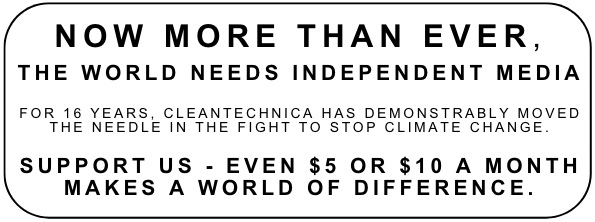
Sign up for daily news updates from CleanTechnica on email. Or follow us on Google News!
Carlos Ghosn, the former head of the Renault-Nissan-Mitsubishi Alliance, has some thoughts on the proposed new partnership between Honda, Nissan, and possibly Mitsubishi. Not surprisingly, Ghosn is not feeling all that friendly toward Nissan these days, after it conspired with the Japanese government to throw him in jail. Those sorts of things could sour any relationship. This week, he had a conversation with Bloomberg’s Manus Cranny to discuss what he sees as the future of the Japanese auto industry. As someone intimately familiar with the companies involved, his thoughts make for interesting reading.
Carlos Ghosn Speaks
Q. Is this a pragmatic deal, or a desperate roll of the dice?
A. It’s a desperate move. It’s not a pragmatic deal because frankly the synergies between the two companies are difficult to find. They’re in the same markets, they have the same products, the brands are very, very similar. From one side, Nissan, it’s a desperate move to try to find a future. And from the other side, Honda — if I understand well, they were not very excited about this move, but you know, you have to count with METI (Ministry of Economy, Trade, and Industry) in Japan. They’re trying to figure out something that could marry the short term problems of Nissan and the long term vision of Honda.
Q. Are politics behind this deal then, rather than value?
A. Without any doubt. From all the data that I’ve received about the performance of Nissan — which has been miserable at least for the last two to three years — they have cash problems, investment problems, they’re being really hammered in the US, they’ve practically got out of Europe, they’re being challenged in China, and there is no plan in front of it. There is panic mode inside Nissan.
There are several more questions and answers in the article, some fascinating ones. I encourage you to read it.
Unpacking The Message
One word that fits Carlos Ghosn to a T is “pragmatic.” He’s a no bullshit kind of guy who is often quite grating in his relationships with others. He tells it like it is. CleanTechnica reported recently on how the Japanese car companies — especially Nissan — are getting pummeled by Chinese competitors, both in China and throughout Southeast Asia where once they dominates those markets.
For its part, Honda — which makes world class cars — has lacked a clear vision about how it expects to handle the transition to electric cars that is happening around the world. In North America, it cozied up to General Motors for the hot selling Prologue electric SUV, then severed the relationship. It has made noises about building a new EV base of operations in Canada, but now says it will build its future electric cars in Ohio.
Ghosn talked about Honda’s engineering prowess. It was the first Japanese company to build engines for Formula One, and even though its involvement with the sport has waxed and waned over the years, the engine it designed is still the heart of the Red Bull powertrain. Whether its engineers will mesh with those from Nissan is a valid question. There is also the suggestion in what Ghosn told Bloomberg that the Honda-Nissan-Mitsubishi collaboration may be more of a shotgun wedding promoted by METI for political reasons than something Honda is all that excited about.
Ghost is also a student of the global auto industry. One could gather from his remarks that the US auto industry — which basically ignores most markets outside of North America — is heading into the same blind alley he sees Japan going down. America makes ginormous vehicles — always has — while much of the market in other countries is focused on smaller, more efficient, and less costly vehicles. Among US companies, only Tesla is truly international in scope.
Ghosn notes that automakers need to be global, and those that can’t compete globally will get eaten up. He doesn’t see them dying, but instead sees their weak, low-valued brands being bought out by bigger, more functional companies. He suggests Foxconn could buy Nissan, for example. They’re not going to be the only one to try to do that, he adds. Instead of building something from scratch, you can take control of an existing car manufacturer at a relatively cheap price, get rid of everything you don’t need, and really concentrate on what’s important. I’m expecting a lot of moves like this in the future, particularly for the weaklings of the car industry.
The unspoken part of the conversation Carlos Ghosn had with Bloomberg is how much support national governments will be willing to give their domestic auto manufacturers to counter the challenge from China. Most of us remember how GM promised the Obama administration it would use government bailout money to build smaller, more efficient cars, only to take those cars out of production almost as soon as Uncle Sugar’s check cleared to concentrate on bigger trucks and SUVs. Many see the US auto industry sailing into troubled waters again and wonder if the government will remember how it got flimflammed the last time?
As a corollary to that discussion, Bloomberg this week also mentioned Bernie Moreno, a successful auto dealer from Ohio who will be headed to Washington soon to take his seat in the Senate. Moreno wants to carve out a major role for himself shaping automotive policy during a second Trump term, Bloomberg says. One of the items on his agenda is agitating for Stellantis to divest itself from the Jeep, Ram, Dodge, and Chrysler brands, which he believes have been grossly mismanaged by European interests and belong back in American hands. “They’ve been a terrible steward of the brands,” Moreno said. “I’m hoping that John Elkann does the right thing and spins off Chrysler Corporation and puts its back in American ownership.”
That’s maybe a good idea, but if it happens, it will isolate the US auto industry even further from the global auto market and cut off the only access those brands currently have to the technology they need to navigate the transition to electric vehicles. America, it seems, is well on its way to being an island in the international sea of commerce, content to offer nothing the world community wants to buy other than oil and LNG. Whether that is a wise long-term plan for a country that was once the powerhouse of international trade is yet to be determined. We wonder what Carlos Ghosn would have to say about that?

Chip in a few dollars a month to help support independent cleantech coverage that helps to accelerate the cleantech revolution!
Have a tip for CleanTechnica? Want to advertise? Want to suggest a guest for our CleanTech Talk podcast? Contact us here.
Sign up for our daily newsletter for 15 new cleantech stories a day. Or sign up for our weekly one if daily is too frequent.
CleanTechnica uses affiliate links. See our policy here.
CleanTechnica’s Comment Policy




